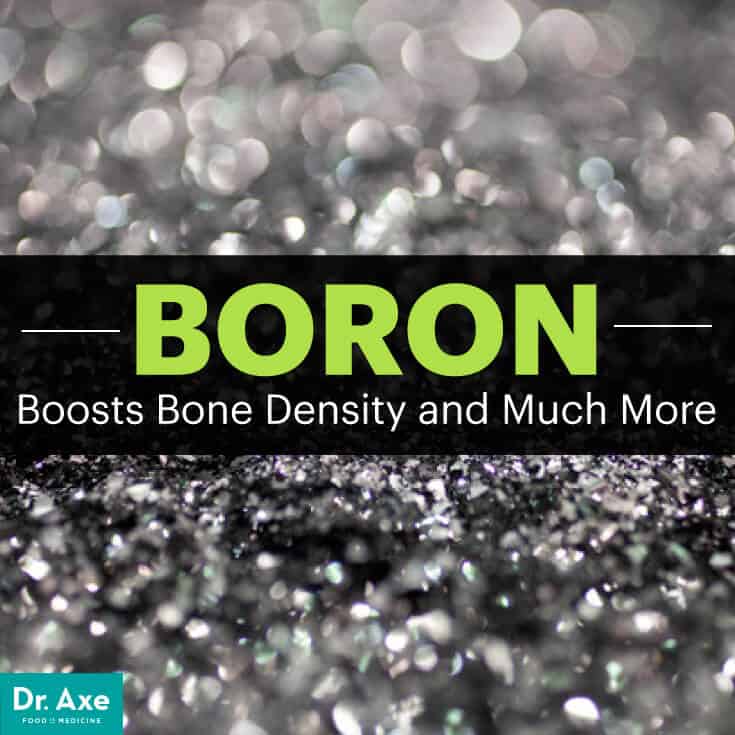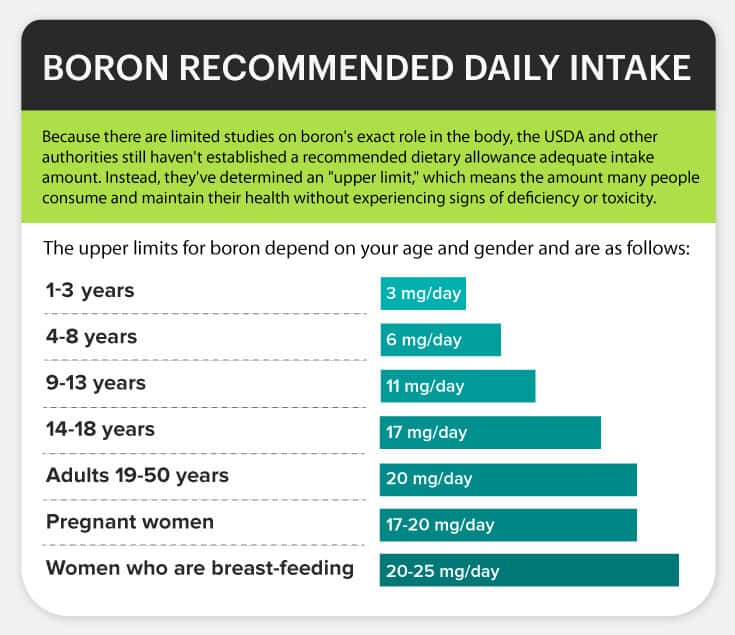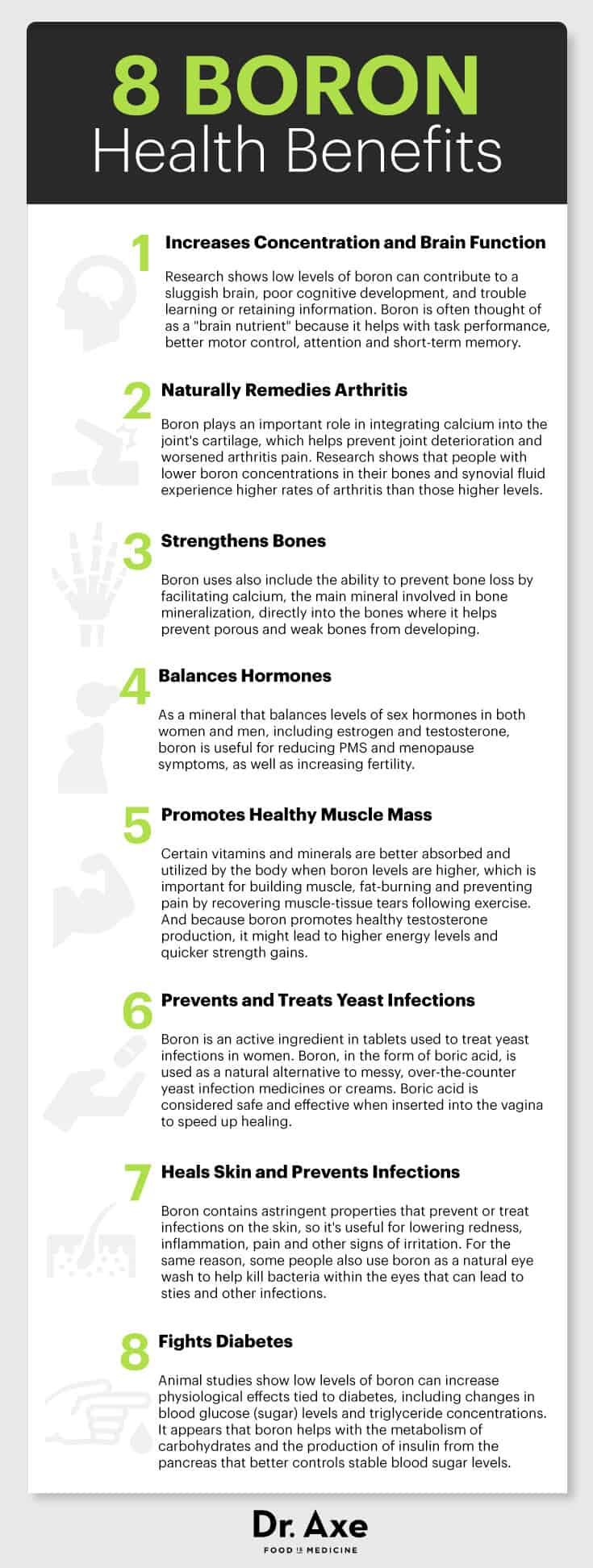Boron Uses — Boost Bone Density and Much More
by Dr. Axe
draxe.com
Boron is an important, and often underutilized, trace mineral naturally present in certain foods and also within the environment. Boron uses include the ability to help keep the skeletal structure strong by adding to bone density, preventing osteoporosis, treating conditions like arthritis, and improving strength and muscle mass.
Boron is used by many athletes and bodybuilders because it’s believed to increase the body’s ability to produce and use testosterone, so it’s beneficial for recovering from exercise, preventing aches and pains, building muscle mass, and keeping bones strong. Additionally, boron is linked to improved brain function in some instances since it helps boost concentration, focus and the ability to learn new information. (1)
What are some other boron uses? Boron is linked with helping prevent conditions, including: (2)
- Arthritis
- Osteoporosis and weak or broken bones
- Low concentration or “brain fog”
- Poor memory
- Signs of aging on the skin
- Worsened menopausal and PMS symptoms
- Allergies
- Weak muscles
- Stomach and digestive parasites
- Candida infection and yeast infections
- Eye infections
Boron uses even include the ability to help animals suffering from pain. Horses, sheep and other domesticated animals that develop signs of arthritis are sometimes given boron supplements to ease pain and inflammation.
In fact, because levels of boron in foods are highly dependent on how healthy the soil is where the crops are grown, animals that graze on depleted soils low in boron usually have less muscle, and more bone and joint pain as they age than animals raised on boron-rich soils.
How Do We Get Enough Boron?
Boron is naturally found in many whole foods, especially beans, nuts, whole grains and avocados, as well as fruits like berries, plums, oranges and grapes. It’s also found in water to some degree, although we get most of our boron from our diets.
The type of boron we obtain from food is primarily boric acid, B(OH)3, which is naturally present only in plants. Researchers believe boron works to stabilize molecules within plants, including beneficial polysaccharides and sterols, although the exact way boron works in both plants and humans is still somewhat unknown.
Another theory is boron helps balance pH levels and assists the body in handling other minerals like magnesium, calcium and phosphorus by producing necessary digestive enzymes. While there’s still a lot to learn about this mineral, one of the most researched boron uses is its ability to increase estrogen levels in both healthy women and men, which is one reason it’s linked to healthy bones and fewer signs of age-related diseases like cognitive decline and arthritis.
Recommended Daily Intake of Boron
You can make sure you get enough boron by eating a varied diet of whole, real food sources. While exact levels of boron are still not exactly known (and vary a lot depending on where the food was grown), the USDA reports that most people usually consume enough boron to meet their needs and get most of their boron from these foods: coffee, milk, apples, beans and potatoes. Together, these foods are responsible for about 27 percent of the boron most people consume.
Even though it’s believed that coffee and milk aren’t the best sources of boron — they might actually be somewhat low in boron compared to many legumes, vegetables and fruits — they were the top contributors in the American diet because of the high amount many people consume of them.
Because there’s limited studies involving boron’s exact role in the body, the USDA and other authorities still haven’t established a clear biological function for boron in humans or a recommended dietary allowance. Instead, they’ve determined an “upper limit,” which means the amount many people consume and maintain their health without experiencing signs of deficiency or toxicity.
The upper limits for boron depend on your age and gender and are as follows: (3)
- 1–3 years: 3 milligrams/day
- 4–8 years: 6 milligrams/day
- 9–13 years: 11 milligrams/day
- 14–18 years: 17 milligrams/day
- Adults 19–50 years: 20 milligrams/day
- Pregnant women : 17–20 milligrams/day
- Women who are breastfeeding: 20–25 milligrams/day
Health Benefits of Boron
1. Increases Concentration and Brain Function
Research shows low levels of boron can contribute to a sluggish brain, poor cognitive development, and trouble learning or retaining information. Boron is often thought of as a “brain nutrient” because it can help with task performance, better motor control, attention and even short-term memory.
When researchers compared the effects of low boron intake in healthy adults with higher intake, there was a significant increase in the proportion of low-frequency brain activity and a decrease in the proportion of higher-frequency activity in the group taking more boron.
Results showed improvements in task performance on various cognitive and psychomotor tests in the group receiving more boron, including better response times, motor skills and manual dexterity, eye-hand coordination, attention, perception, and both short- and long-term memory. (4)
2. Helps Reverse Arthritis
Boron plays an important role in the integration of calcium into the joint’s cartilage, which helps prevent joint deterioration and arthritis pain. Research shows people with lower boron concentrations in their bones and synovial fluid experience higher rates of arthritis than those with higher levels. Other study observations show evidence that bones of patients using boron supplements are much harder to cut than those of patients not using supplements. (5)
According to some epidemiologic studies, in areas of the world where boron intake is lower (around one milligram or less/day) the incidence of arthritis is significantly higher than in areas where boron intake is higher (around three to 10 milligrams/day on average).
3. Strengthen Bones
Boron uses also include the ability to prevent bone loss by facilitating calcium, the main mineral involved in bone mineralization, directly into the bones, where it helps prevent porous and weak bones from developing. Boron also protects bones because of its role in regulating estrogen function.
Additionally, studies show boron can help the body produce and use vitamin D better, which is a crucial nutrient for healthy bone formation, in addition to many other things like immune function and cognitive processes.
A study by the Department of Orthopedics at Red Cross Hospital in China found that boron supplements can increase bone formation and inhibit bone resorption, producing therapeutical protection against osteoporosis in animal studies. When rats were fed a boron-deprived diet, they experienced spongy bones, bone loss in the femurs and lumbar vertebrae, and increased osteoporotic conditions. On the other hand, rats given high-boron supplements showed improvements in bone mass, bone thickness, bone volume and higher levels of estradiol (a hormone tied to bone health). (6)
4. Balances Hormones
As a mineral that can help balance levels of sex hormones in both women and men, including estrogen and testosterone, boron helps relieve menopause symptoms as well as PMS, and also for increasing fertility. In animal studies, boron depletion is linked with fertility problems and birth defects, which suggests that boron can play a role in healthy reproduction and fetus development. (7)
In two small studies by the U.S. Department of Agriculture, when menopausal women were first fed a diet that provided low levels of boron and then were fed a diet richer in boron, they experienced lower levels of calcium and magnesium loss through urine and elevated (but still considered healthy) levels of estrogen and testosterone. (8)
5. Promotes Healthy Muscle Mass
Certain vitamins and minerals are better absorbed and utilized by the body when boron levels are higher, which is important for building muscle, burning fat and preventing pain by recovering muscle-tissue tears following exercise. And because boron helps promote healthy testosterone production, it might lead to higher energy levels and quicker strength gains.
Other research also shows that boron uses may including boosting athletic performance because it helps the brain think quickly, react better to stimulus and demonstrate hand-eye coordination, in addition to keeping bones and joints stronger and free from pain.
This is one reason why boron appears in more protein powders and athletic supplements promising better results, although more research is still needed to confirm whether or not boron can definitely impact body composition and physical abilities without being combined with other factors.
6. Prevents and Treats Yeast Infections
Boron is an active ingredient in tablets used to treat yeast infections in women. Boron, in the form of boric acid, is used as a natural alternative to messy over-the-counter yeast infection medicines or creams. Boric acid is considered safe and effective when inserted into the vagina to speed up healing of painful infections.
According to results from a double-blind comparison study looking at the effects of boron compared to another type of commercial yeast infection cream (made from nystatin), boron was better able to cure yeast infections. Ninety-two percent of women had relief after seven to 10 days of boron treatment compared to 64 percent using the standard cream.
Boron produced no unwanted side effects and was also self-made and much less expensive than the cream, leading researchers to conclude that boric acid is a natural fungistatic and can be a better, cost-effective option than “messy” vaginal creams. (9)
7. Heals Skin and Prevents Infections
Boron uses include acting as an astringent to help prevent or treat infections on the skin, so it’s useful for lowering redness, inflammation, pain and other signs of irritation. For the same reason, some people also use boron as a natural eye wash to help kill bacteria that can lead to sties and other infections.
8. Fights Diabetes
Animal studies show that low levels of boron can increase physiological effects tied to diabetes, including changes in blood glucose (sugar) levels and triglyceride concentrations. It appears that boron can help with the metabolism of carbohydrates and the production of insulin from the pancreas that better controls stable blood sugar levels, so in the future we might see that boron uses include acting as a treatment for forms of insulin resistance.
Best Food Sources of Boron
While a comprehensive list of boron content within common foods isn’t yet available, below are 14 of the highest sources of boron. Another fun fact about boron uses? Boron acts as a natural food preservative within foods.
Because boron helps diminish bacteria growth, it’s a natural way to prevent crops from spoiling, so during World War I and II it was added to foods to prolong their freshness and reduce food pathogens when refrigeration wasn’t always possible.
- Beans (black, lima, kidney, snap peas, mung)
- Artichokes
- Berries
- Cherries
- Sweet potatoes
- Onions
- Pecans
- Walnuts
- Figs
- Prunes/plums
- Peaches
- Apricots
- Cocoa
- Apples
- Pears
- Avocado
- Grapes (and pure grape juice)
- Oranges
- Coffee
- Red wine
- Raw Milk (organic, unpasteurized)
Recipes High in Boron
You can naturally increase your intake of boron by making some of these recipes that include boron-rich foods:
Avocado Salad Wrap Recipe
INGREDIENTS:
- 2 avocados, cubed
- 1 red pepper, diced
- 2 tablespoons red onions, diced
- 3 garlic cloves, minced
- 1/4 cup fresh cilantro, chopped
- 2 teaspoons lemon juice
- 6–8 romaine lettuce, roughly chopped
DIRECTIONS:
1. Mix all ingredients in a bowl.
2. Scoop out approximates 1/2 cup into gluten-free wrap and roll.

What Are Concerns and Interactions of Taking Boron?
Boron is widely recognized as being very safe for consumption in both humans and animals. In fact, some farmers even treat soil with high levels of boron and give boron supplements to their livestock to reduce the effects of radiation in the environment. Industrial boron uses include its ability to capture radioactivity within soils, ionizing it and reducing potential health risks like cancer.
Of course, like with all nutrients, very high levels can also cause potential problems. Boron toxicity isn’t a risk when consuming whole foods, but taking high doses of supplements can potentially become dangerous and cause reactions like nausea, gastric discomfort, vomiting, diarrhea, skin problems, heart palpitations, anxiety anddepression.
The National Institute of Health also warns consumers that boron supplements can be harmful to people with hormone-sensitive conditions like breast or prostate cancer, endometriosis, and uterine fibroids since it can increase estrogen levels. People with existing cases of kidney disease or liver disease should also use boron supplements very carefully and speak with a doctor first since these conditions can alter the way the body gets rid of excess boron and other minerals.
As always, it’s best to get boron (and all other vitamins and minerals) from real whole foods whenever possible as opposed to supplements. How much boron is too much? Lethal doses of boron are believed to be about 15 to 20 grams/day for adults and three to six grams/day for infants, although many studies find minimal or no toxicity at these levels or even higher.



